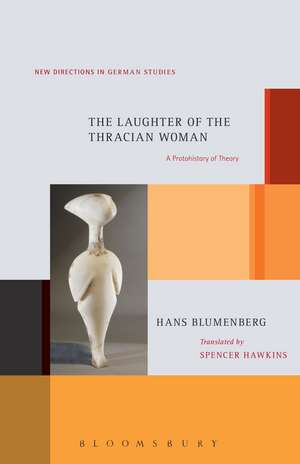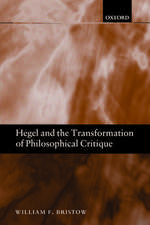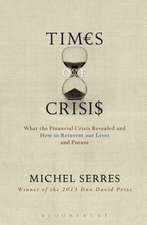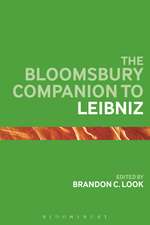The Laughter of the Thracian Woman: A Protohistory of Theory: New Directions in German Studies
Autor Hans Blumenberg Traducere de Spencer Hawkinsen Limba Engleză Paperback – 17 iun 2015
| Toate formatele și edițiile | Preț | Express |
|---|---|---|
| Paperback (1) | 190.06 lei 6-8 săpt. | |
| Bloomsbury Publishing – 17 iun 2015 | 190.06 lei 6-8 săpt. | |
| Hardback (1) | 771.75 lei 6-8 săpt. | |
| Bloomsbury Publishing – 17 iun 2015 | 771.75 lei 6-8 săpt. |
Din seria New Directions in German Studies
- 14%
 Preț: 183.70 lei
Preț: 183.70 lei -
 Preț: 470.90 lei
Preț: 470.90 lei - 8%
 Preț: 145.46 lei
Preț: 145.46 lei - 11%
 Preț: 219.84 lei
Preț: 219.84 lei - 23%
 Preț: 190.50 lei
Preț: 190.50 lei -
 Preț: 169.03 lei
Preț: 169.03 lei -
 Preț: 217.09 lei
Preț: 217.09 lei - 7%
 Preț: 134.49 lei
Preț: 134.49 lei - 14%
 Preț: 183.24 lei
Preț: 183.24 lei -
 Preț: 217.62 lei
Preț: 217.62 lei - 21%
 Preț: 214.78 lei
Preț: 214.78 lei - 30%
 Preț: 718.85 lei
Preț: 718.85 lei - 22%
 Preț: 237.93 lei
Preț: 237.93 lei - 22%
 Preț: 225.77 lei
Preț: 225.77 lei - 22%
 Preț: 256.77 lei
Preț: 256.77 lei - 22%
 Preț: 225.41 lei
Preț: 225.41 lei - 23%
 Preț: 222.46 lei
Preț: 222.46 lei - 30%
 Preț: 714.12 lei
Preț: 714.12 lei - 30%
 Preț: 568.22 lei
Preț: 568.22 lei - 21%
 Preț: 218.36 lei
Preț: 218.36 lei - 11%
 Preț: 218.47 lei
Preț: 218.47 lei - 13%
 Preț: 186.35 lei
Preț: 186.35 lei - 30%
 Preț: 569.94 lei
Preț: 569.94 lei - 21%
 Preț: 218.83 lei
Preț: 218.83 lei - 22%
 Preț: 256.20 lei
Preț: 256.20 lei - 23%
 Preț: 197.14 lei
Preț: 197.14 lei - 13%
 Preț: 255.11 lei
Preț: 255.11 lei - 22%
 Preț: 226.79 lei
Preț: 226.79 lei - 30%
 Preț: 568.14 lei
Preț: 568.14 lei - 14%
 Preț: 191.85 lei
Preț: 191.85 lei -
 Preț: 183.24 lei
Preț: 183.24 lei -
 Preț: 231.81 lei
Preț: 231.81 lei - 22%
 Preț: 230.24 lei
Preț: 230.24 lei
Preț: 190.06 lei
Preț vechi: 221.76 lei
-14% Nou
Puncte Express: 285
Preț estimativ în valută:
36.37€ • 37.97$ • 30.10£
36.37€ • 37.97$ • 30.10£
Carte tipărită la comandă
Livrare economică 05-19 aprilie
Preluare comenzi: 021 569.72.76
Specificații
ISBN-13: 9781623562304
ISBN-10: 1623562309
Pagini: 224
Dimensiuni: 140 x 216 x 15 mm
Greutate: 0.27 kg
Editura: Bloomsbury Publishing
Colecția Bloomsbury Academic
Seria New Directions in German Studies
Locul publicării:New York, United States
ISBN-10: 1623562309
Pagini: 224
Dimensiuni: 140 x 216 x 15 mm
Greutate: 0.27 kg
Editura: Bloomsbury Publishing
Colecția Bloomsbury Academic
Seria New Directions in German Studies
Locul publicării:New York, United States
Caracteristici
The first translation into English of a work by an important modern German philosopher
Notă biografică
Hans Blumenberg (1920-1996) was one of the most significant German philosophers of the twentieth century. His publications include The Legibility of the World, Legitimacy of the Modern Age, Genesis of the Copernican World, Work on Myth, and Out of the Cave. Spencer Hawkins is an Instructor in the Cultures, Civilizations, and Ideas program at Bilkent University, Turkey.
Cuprins
Introduction: Reading into the Distance About this book I. Theory as exotic behavior II. Socrates is shifted into protohistory III. Knowledge about heaven and capability on earth IV. The theorist between comedy and tragedy V. Reoccupations VI. Astrological predominance VII. Applause and scorn from the moralists VIII. As adopted by historical critique IX. From cursing sinners to scorn for the Creation X. Tycho Brahe's coachman and the earthquake in Lisbon XI. Absentmindednesses XII. In what matter Thales had failed according to Nietzsche XIII. How to recognize what matters IVX. Interdisciplinarity as repetition of protohistory Works Cited
Recenzii
This English translation of Das Lachen der Thrakerin, the original German of which first appeared with Suhrkamp in 1987, will no doubt intensify the impression among anglophone readers that Blumenberg is a decidedly historical and literary philosopher whose own thinking emerges from an almost obsessive level of engagement with the minutiae of Western intellectual history, including the genre of the philosophical anecdote ... Like many of Blumenberg's works, Das Lachen der Thrakerin demands a lot of the reader: a detailed knowledge of the Western tradition, not only of philosophy, but of letters in general, from the Presocratics to the present; and patience with an argumentative method which revels in the detours and the details, and which is thin on orienting summaries (here the highly informative Afterword and scholarly apparatus provided by Hawkins offer much historical context and orientation).
Greek astronomer Thales of Miletus was the original absent-minded professor. He was walking and studying the night sky, it is said, when he tripped and fell into a well, leading him to theorize that water-and not a god or gods-was the prime mover of reality. German-Jewish 'philosophical anthropologist' Blumenberg follows the myth of Thales through the ages to show that the scientific endeavor is necessary but also fundamentally ridiculous. It culminates with an attack on 'incomprehensible arrogance' as the most destructive human tendency, reaffirming modesty and skepticism. Today everything is made of data instead of water; Blumenberg, translated with great care by Spencer Hawkins, reminds me that we are still as ridiculous as Thales.
In its sweeping scope and singular focus, Hans Blumenberg's The Laughter of the Thracian Woman provides a monadic history of how to read the beginning of thinking as located precisely at the nexus of storytelling and reflection, literature and philosophy. In Blumenberg's series of relentless reconstructions and analyses, the telling and re-telling of the anecdote of Thales falling into a well - over and over again, from Plato to Heidegger, accompanied by the Thracian woman's laughter - comes to form the central image for the tension within philosophy between theoretical reflection and intuitive insight.
Hans Blumenberg stands as one of the most important and innovative thinkers of the twentieth century. As a philosopher, historian of science, and literary scholar, his work has made indispensable contributions to a broad range of fields across the Humanities and the Social Sciences. This impeccably nuanced translation of The Laughter of the Thracian Woman promises to enhance our understanding of Blumenberg's methodology and the theoretical premises that drive his thought, while offering key insights into the perennial tensions between theory and realism, contemplation and action, philosophical reflection and the Lebenswelt.
Greek astronomer Thales of Miletus was the original absent-minded professor. He was walking and studying the night sky, it is said, when he tripped and fell into a well, leading him to theorize that water-and not a god or gods-was the prime mover of reality. German-Jewish 'philosophical anthropologist' Blumenberg follows the myth of Thales through the ages to show that the scientific endeavor is necessary but also fundamentally ridiculous. It culminates with an attack on 'incomprehensible arrogance' as the most destructive human tendency, reaffirming modesty and skepticism. Today everything is made of data instead of water; Blumenberg, translated with great care by Spencer Hawkins, reminds me that we are still as ridiculous as Thales.
In its sweeping scope and singular focus, Hans Blumenberg's The Laughter of the Thracian Woman provides a monadic history of how to read the beginning of thinking as located precisely at the nexus of storytelling and reflection, literature and philosophy. In Blumenberg's series of relentless reconstructions and analyses, the telling and re-telling of the anecdote of Thales falling into a well - over and over again, from Plato to Heidegger, accompanied by the Thracian woman's laughter - comes to form the central image for the tension within philosophy between theoretical reflection and intuitive insight.
Hans Blumenberg stands as one of the most important and innovative thinkers of the twentieth century. As a philosopher, historian of science, and literary scholar, his work has made indispensable contributions to a broad range of fields across the Humanities and the Social Sciences. This impeccably nuanced translation of The Laughter of the Thracian Woman promises to enhance our understanding of Blumenberg's methodology and the theoretical premises that drive his thought, while offering key insights into the perennial tensions between theory and realism, contemplation and action, philosophical reflection and the Lebenswelt.

















